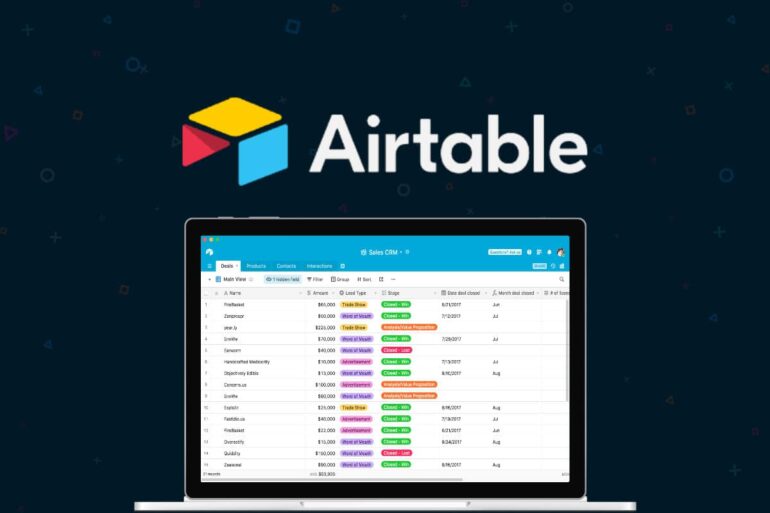TL;DR:
- Ambereen Toubassy, CFO of Airtable, warns that businesses must adopt AI to avoid falling behind.
- Internet, mobile, and cloud computing have been major technological advancements, but AI is the most pervasive and essential.
- AI implementation varies for each business, including tasks like job descriptions, product naming, and legal contract reviews.
- Over the next five years, AI will automate routine tasks while humans contribute creative and strategic thinking.
- Companies that provide AI tools to employees will realize AI’s potential for productivity, employee satisfaction, and retention.
- Despite concerns about job displacement, past technological shifts show that new jobs will emerge with AI integration.
- Airtable has fully embraced AI and offers integrations for incorporating AI into data and processes.
- AI in Airtable includes pre-built components, templates, and prompts for advanced knowledge work.
Main AI News:
Businesses that neglect to incorporate artificial intelligence (AI) into their daily operations run the risk of lagging behind their competitors, warns Ambereen Toubassy, the Chief Financial Officer of Airtable. In an interview with Fox News Digital, she emphasized the significance of AI adoption, stating, “Ultimately, businesses that don’t adopt AI risk falling behind.”
Over the years, the internet, mobile technology, and cloud computing have emerged as major technological advancements, each revolutionizing industries, fostering the growth of new companies, and enhancing productivity. Toubassy argues that while the internet has had the most pervasive impact, companies can still thrive without fully embracing the cloud. However, she likens AI to the internet, asserting that companies cannot afford to ignore its potential.
The implementation of AI in workplaces will vary across businesses, but Toubassy suggests several applications, such as generating job descriptions, naming products, and reviewing legal contracts. She anticipates that AI will bring about significant changes in the nature of work within the next five years, with routine tasks being automated while humans contribute their creative and strategic thinking alongside AI.
This era presents an unprecedented opportunity for enterprises to reimagine their approach to work, leveraging AI to achieve faster and more favorable business outcomes. Toubassy encourages businesses to equip their employees with the necessary tools to deploy and leverage AI effectively, emphasizing that these proactive companies will be the first to unlock the full potential of AI, benefitting from increased productivity, employee satisfaction, and retention.
Despite concerns about AI displacing jobs, Toubassy dismisses them, pointing out that the nature of employment has constantly evolved. The National Bureau of Economic Research estimates that 60% of today’s workers are employed in occupations that didn’t exist in 1940. Toubassy draws parallels to the emergence of software developers and social media influencers, highlighting that the future will bring about new jobs that we cannot currently imagine. However, she asserts that past technological shifts provide confidence in our ability to adapt and thrive in the face of AI integration.
Airtable stands as a testament to embracing AI, having fully integrated these technologies into its products. Recently, the company announced integrations that enable businesses to incorporate AI into their data and processes. Airtable AI offers a comprehensive library of pre-built components, templates, and prompts, empowering users to customize and combine them to support advanced and creative forms of knowledge work, as detailed in the company’s press release.
In the ever-evolving business landscape, the integration of AI is no longer an option but a necessity for organizations seeking to remain competitive. With its transformative potential, AI will redefine work processes and empower businesses to achieve new levels of efficiency and innovation. By capitalizing on this remarkable opportunity, companies can position themselves at the forefront of AI adoption, shaping the future of work and reaping the associated benefits.
Conlcusion:
The increasing adoption of artificial intelligence (AI) in businesses signifies a transformative shift in the market. Companies that fail to embrace AI technologies risk falling behind their competitors and missing out on the numerous benefits it offers. AI integration allows for the automation of routine tasks, empowering employees to focus on creative and strategic thinking, leading to increased productivity and better business outcomes.
Market players that provide their workforce with AI tools and resources will likely experience the faster realization of AI’s potential, thereby gaining a competitive edge in terms of productivity, employee satisfaction, and retention. The market landscape will continue to evolve as AI becomes an indispensable tool for driving innovation, efficiency, and success in various industries. Embracing AI is not merely an option; it is a strategic imperative for organizations aiming to thrive in the dynamic and AI-driven marketplace.

